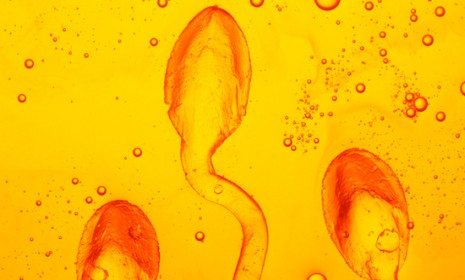Semen: Nature's antidepressant?
A controversial new study finds that women who regularly have unprotected sex are healthier, happier, and generally sleep better than women who don't

A free daily email with the biggest news stories of the day – and the best features from TheWeek.com
You are now subscribed
Your newsletter sign-up was successful
A new study by researchers at SUNY Albany claims to have identified an unexpected weapon against depression: Unprotected sex. Apparently, semen is rich in chemicals that help increase a partner's happiness, mood, and even quality of sleep. But before you gloomily toss those problematic condoms in the trash, here's what you should know:
How could the benefits possibly outweigh the risks that unprotected sex holds for many people?
This is the study's obvious flaw. After all, having dozens of kids probably isn't good for a women's mood or sleep schedule, says Denise A. Justin at Opposing Views. And neither are sexually transmitted diseases. But researchers suggest that if you're a woman in a monogamous relationship and taking birth control (or not, if you're trying to get pregnant), skipping the condom could do wonders for your mood. The study, unfortunately, did not look into same-sex relationships.
The Week
Escape your echo chamber. Get the facts behind the news, plus analysis from multiple perspectives.

Sign up for The Week's Free Newsletters
From our morning news briefing to a weekly Good News Newsletter, get the best of The Week delivered directly to your inbox.
From our morning news briefing to a weekly Good News Newsletter, get the best of The Week delivered directly to your inbox.
How exactly does semen help?
Semen contains a number of "mood-altering chemicals," says Neetzan Zimmerman at Gawker: Estrone and oxytocin elevate mood, cortisol helps promote affection, serotonin is an antidepressant, and melatonin helps regulate sleep patterns.
How did researchers conduct the study?
They surveyed 293 females on SUNY Albany's campus to identify possible connections between unprotected sex and a person's overall happiness. To gauge the emotional health of participants, researchers had women complete the Beck Depression Inventory, a standard clinical test for determining depressive symptoms, says Zimmerman.
A free daily email with the biggest news stories of the day – and the best features from TheWeek.com
What did they find?
The results showed that sexually active women who never used condoms showed significantly fewer depressive symptoms and also slept better than women who always or usually used condoms, says Sara C. Nelson at The Huffington Post. The findings also indicated that the women in the study who described themselves as "promiscuous" yet regularly used condoms were just as depressed as women who were abstinent. "The team says this suggests it is semen, not just sex," that is raising some women's happiness levels. Caveat: "Happiness" is a notoriously complex emotion that can be affected by any number of factors.
Why is this?
One prevalent theory is that a woman's body can detect and recognize semen from long-term or recurrent partners. From an evolutionary standpoint, there's an advantage to a mate's sperm triggering chemical feelings of affection and feelings of closeness.
Sources: ABC News, Gawker, Huffington Post, Opposing Views
-
 How the FCC’s ‘equal time’ rule works
How the FCC’s ‘equal time’ rule worksIn the Spotlight The law is at the heart of the Colbert-CBS conflict
-
 What is the endgame in the DHS shutdown?
What is the endgame in the DHS shutdown?Today’s Big Question Democrats want to rein in ICE’s immigration crackdown
-
 ‘Poor time management isn’t just an inconvenience’
‘Poor time management isn’t just an inconvenience’Instant Opinion Opinion, comment and editorials of the day